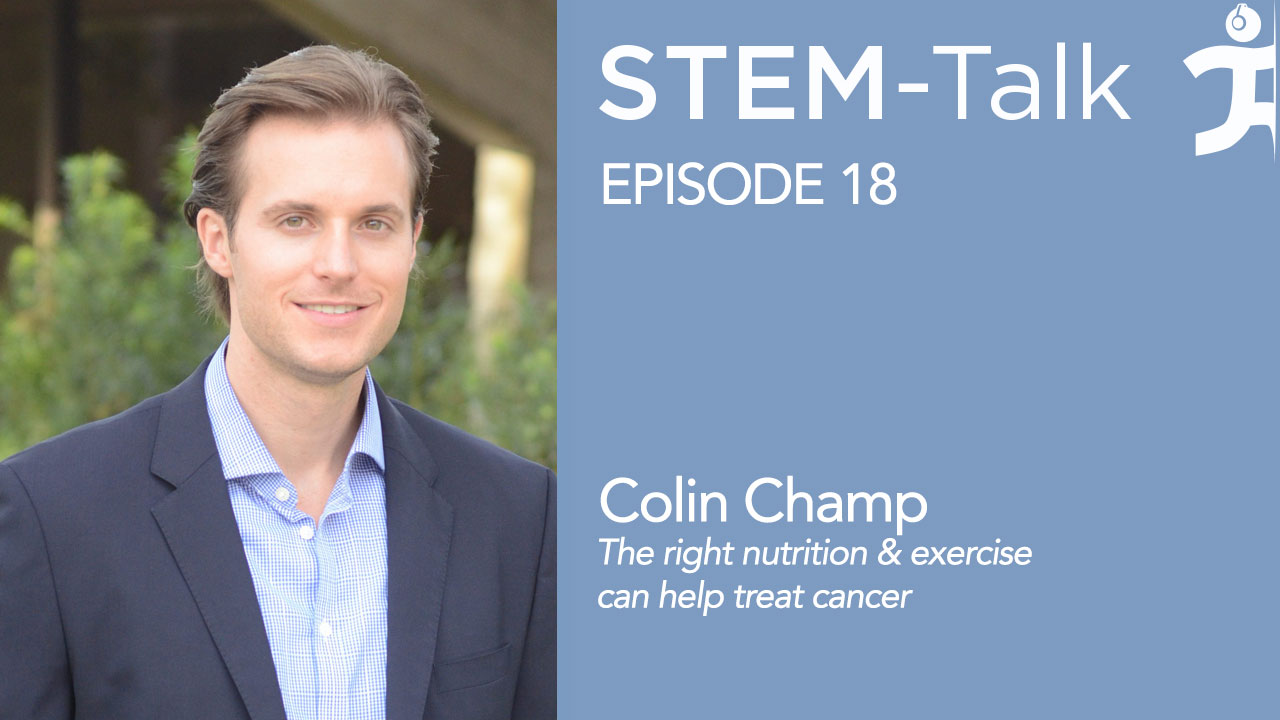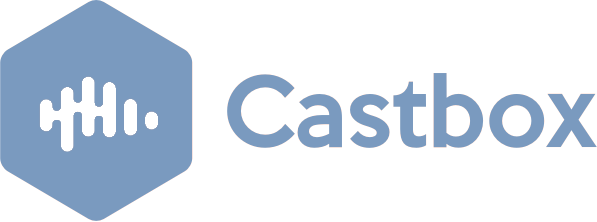STEM-Talk
Episode 18: Dr. Colin Champ talks about how the right nutrition and exercise can help treat cancer
// Aug 16, 2016

As STEM-Talk Host Dawn Kernagis points out in this interview, guest Colin Champ looks like he could be featured on the television show “The Bachelor.” But the striking young doctor (who alas, is in a serious relationship) is a radiation oncologist at the University of Pittsburgh Cancer Center.
Dr. Champ is also deeply invested in researching how exercise and nutrition can help treat and prevent cancer. In his very popular book entitled, “Misguided Medicine: The Truth Behind Ill-Advised Medical Recommendations and How to Take Health Back into Your Hands,” Champ tackles several popularly-held myths regarding health such as the perils of salt and meat intake. Take a look at: http://tinyurl.com/jokel72
On Dr. Champ’s web site, The Caveman Doctor, http://www.cavemandoctor.com/start-here/, he also challenges conventional wisdom and governmental guidelines on nutrition.
Dr. Champ received his medical degree from Thomas Jefferson University in Philadelphia and his bachelor’s in chemical engineering from MIT. He grew up, in his own words, in the “blue-collar, steel town” of Pittsburgh, in a mixed lineage family of Austrians, Irish and Southern Italians.
At an early age, he excelled at both sports and science.
Dr. Champ’s lecture at IHMC, “Augmenting Cancer Therapy with Diet,” can be found at: https://www.youtube.com/watch?v=ot96y5-D_K0
He also regularly writes for Health Wire: http://www.myhealthwire.com/editors/dr-colin-champ
In this STEM-Talk episode, Dawn and IHMC Director and CEO Ken Ford talk with Dr. Champ.
3:33: Dawn introduces Dr. Champ as a radiation oncologist focused on breast cancer, cancers of the central nervous system, clinical nutrition/exercise relating to cancer treatment/prevention. He is board certified in both radiation oncology and integrative medicine.
5:00: Champ discusses his upbringing outside of Pittsburgh. “My family structure greatly influenced my life…. My grandfather was the son of Austrian immigrants. My grandmother was Southern Italian. My dad’s side was also Southern Italian and Irish. My grandfather ran the Pittsburgh and Lake Erie railroad accounting with no college education. He built most of his house and was always into health/fitness. He had an organic garden and left a strong imprint on me.”
6:15: Champ’s mother was “a good cop,” and very loving. His father pushed him to work hard, and there were three cornerstones to Champ’s upbringing: sports, health and academics. “Certainly sports played a huge role in my upbringing. I was involved in sports. I played basketball until I hated it.”
7:00: Science was also pushed heavily in the household. “I was good at science and math at a young age.”
7:50: Champ’s father wanted him to go to the Air Force Academy. Champ realized it wasn’t for him and went to MIT instead.
8:55: “From there it was just kind of a springboard of science and really questioning things.” That led him to medical school.
11:20: Champ discusses what drew him to radiation oncology: “I get to see patients everyday. I don’t think in any other field of medicine that you see people so often. It allows you to forge relationships with people. Providing cancer patients with hope is rewarding.” He added that the science of it (for example, working with giant linear accelerators) is a fun aspect of the job.
15:00: Champ says the low-fat diet is a medical myth that makes certain false promises: to make you skinny, prevent diabetes and cancer, and stop your arteries from clogging. Other myths include the need to decrease your salt intake; exercise by running marathons; and stay out of the sun (which has a lot of health benefits). And, “a little stress is not bad for you—it causes body to fight free radicals as innate antioxidant mechanism.”
17:15: Champ discusses the fallacies of the American dietary guidelines.
20:15: Instead, one way to approach diet is by asking questions such as: If you were to not eat anything for the next five days, what would your body eat? A small amount of carbs (50-150 grams per day, for example.)
23:25: Champ says that if you work out a lot, you need to salt load.
26:00: Some epidemiological studies show that eating less fat cholesterol decreases your risk of dying from a heart attack. But that doesn’t decrease your risk of dying from everything else.
29:00: Champ discusses the widely publicized association between processed and red meat and cancer. The findings are based on flawed studies, Champ says: “A lot of the studies group red meat with hot dogs, etc. People are eating these things wrapped around a bun.”
31:20: Meat provides a nutrient-dense resource for our bodies. “Every food can be dangerous to some degree, but we need foods to survive.”
33:20: Vegetarians can also follow the ketogenic diet; they should lean more on macadamia nuts, diary, eggs, and safer oils including those made with avocado, macadamia, and palm.
35:30: Champ discusses his own diet: It’s short on carbs (50-150 grams/day) and high in fat. “I cook a lot; cooking is like meditation. If you don’t cook, it’s pretty hard to maintain a healthy diet.” For breakfast, he eats bone broth or eggs with spinach or Bok Choy; or an omelet; and tea. For lunch, he has a green leafy vegetable, cooked in a fat source like ghee or grass-fed butter; and fish or organ meats. Dinner resembles lunch. The evening before this interview, Champ ate feta cheese-wrapped lamp meatballs, Brussel sprouts, dark chocolate, and red wine.
38:50: Champ does martial arts/lifts weights 3-4 times per week. Low level activity is very good for burning fat; high intensity is good for stimulating muscle growth. “I’m not a fan of long-distance running. It provides a mental benefit for many people. But it wears and tears at the joints and heart.”
42:35: Sun exposure is linked to some skin cancers; squamous and basal cell carcinoma (the latter of which are almost always non-cancerous); and the bad one, melanoma.
44:00: But sun exposure is also associated with a decreased risk of prostate and breast cancer. The sun confers other health benefits including making bones stronger; and lowering blood pressure.
49:00: Mice studies show that combining radiation and the ketogenic diet can kill tumors. “The intriguing thing is that as metabolic therapies come out, the ketogenic diet may provide an escape mechanism for cancer cells.”
54:00: Taking exogenous ketones may make the ketogenic diet easier to follow.
55:00: Commercial break: STEM-Talk is an educational service of the Florida Institute for Human and Machine Cognition, a not-for-profit research lab pioneering ground-breaking technologies aimed at leveraging human cognition, perception, locomotion and resilience.
59:00: Although it’s not completely certain that the ketogenic diet does help cancer patients, Champ says, “we have to keep trying.” Especially for patients with low life expectancy, such as those with glioblastoma, who on average survive only 15-17 months.
1:00:53: AMPK down regulates mTOR (one pathway that tells cancer cells to grow.) It pulls sugar from our blood and up regulates mitochondrial biogenesis. It puts body in an anti-cancer state.
1:07:50: New data is coming out that says fasting 13 hours a day may improve breast cancer outcomes.
1:09:10: It’s the era of the active patient: both exercise and diets (like the ketogenic diet) are allowing patients to take control of their own health.
1:09:38: Champ started the Caveman Doctor web site as a medical resident: to look at the whole medical/healthcare system from a historic point of view: evolutionarily, culturally; common sense wise. And, to make it simple for people to understand. “The goal is to get the average person healthier.”
1:11:10: Champ also tries to get people to question their own food narratives. “I have a lot of issues about how our health is dictated by cultural/societal norms. No one thinks about eating organ meats—or insects.”
1:12:50: Champ wrote a Health Wire article entitled: “Is Exercise Making You Fat?” “If you don’t exercise the right way, and don’t eat the right kind of food, exercise might actually make you fatter.”
1:14:35: Champ follows, and tells his patients, to follow this protocol: Question things first; figure out the answers; implement those. “More often than not, in medical school, we avoid numbers one and two and go to three. We’re taught not to question things.”
1:16:15: “The best patients are those that ask questions. More people need to do that with their own health, especially people on a low-fat diet.”
1:19:30: The whole argument against cholesterol/fat was based on a rabbit study; but rabbits eat nothing like humans, Champ says. There are many non scientific interests with clinical trials. “Even with gold-standard trials, special interests come into play.”
1:21:30: Champ travels regularly to Italy and talks about his favorite (non-pasta/pizza) food there: Italian cheese and wine; squid, octopus, Roman tripe; Florentine steak.
1:25:16: The “Mediterranean diet” is a term that gets used a lot, but what does it really mean? In Italy (and Spain), it means “whole foods; but a lot of cured meat; certainly not a low-fat diet; but it’s real food.”
1:26:50: Champ’s health advice in a nutshell: eat real foods; get eight hours of sleep per night; limit carbs; take the stairs, not the elevator, and park far away; cook your own meals.
1:28:50: Ken calls Champ “impressive on many levels.” Champ’s knowledge provides “a ray of hope in a sometimes bleak medical landscape.”
1:29:26: Dawn and Ken sign off.






